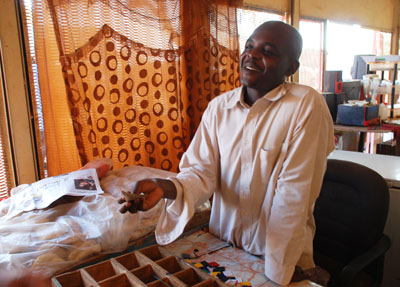
BENTIU, Southern Sudan – Southerners talking about why they want independence from the North in the historic referendum often lace their statements with illusions to bondage, religious repression, and racism. So it’s easy to see the South’s expected vote for separation as a wholesale rejection of the North. But in day-to-day life in southern Sudan’s Unity state capital, northerners and southerners work alongside each other and share common values and mutual respect.
“This place is my home, and I speak the language,” says Abdel Monieum, an imam at a local mosque. “No one says to me, ‘you are a foreigner.’”
Indeed, a stroll through Kalibalek, the main market in Bentiu, illustrates just how well the lives of northerners and southerners are integrated: people puff on communal hookahs, nodding their heads in acknowledgment of each other, clapping handshakes, and loudly bantering around outdoor stalls.
Some northerners, like Hafez Omar, a local brick-maker, were born and raised in Unity state. Omar, who has lived here since before 1956, has even registered to vote in the referendum. Others, like Mohamed Adam Ibrahim, a Darfurian owner of a home goods store, resettled here after fleeing conflict in another of Sudan’s troubled regions. None of the businessmen Enough spoke to said they plan to return to the North, unless political or social circumstances change, which they don’t anticipate.
Government constraints and coercion have not been forthcoming. On the contrary, the southern government has consistently said publicly that the South will welcome northerners to stay, although the criteria for determining citizenship has not yet been announced. The North continues to remain the economic lifeline for southern communities, and northern traders own many of the businesses in this border region. According to rough estimates made by people Enough spoke to in Bentiu, 95 percent of the goods available in Unity state are trucked from Khartoum – just one real-life illustration of why it is important to keep the North-South border porous.
Politico-economic strategy aside, Kalibalek market is in many ways the perfect demonstration of what North-South harmony could look like. According to local history, the market supersedes an earlier failed attempt by southern leadership to blend the two communities and help build peace. In the late 1980s, Riek Machar – at the time a rebel leader, now the South’s vice president – founded Rubh Nagai, another market two hours away by car from Bentiu. Meant to be an experiment to bring Arab and southern traders to one venue for commerce and cohabitation, Rubh Nagai was destroyed during a conflict between Machar and another rebel leader, Paulino Matip. Kalibalek took its place and today serves as the one-stop shop for merchants in the area.
“I feel 100 percent safe here,” said Ibrahim, the Darfurian shopkeeper. “If there is separation and I can get citizenship in the South, I will immediately take it.”
Muslims are an important minority in Unity state, representing about 30-40 percentage of the population. Yet, people say the religious divide has affected few. “There are many families here that have both Muslims and Christians in the house,” said Imam Monieum. “We advise the community to make peace with each other, and there is no problem.”
Said Omar, the northerner born in the South, “I have two wives, one from the North and one from the South, and they never fight.”
The problems that do arise between members of the two communities, people say, are isolated events that do not depict a fundamental pattern. “We have some ‘night visitors,’” said Imam Monieum, describing the occasional confrontation with drunk men who move around town after dark. “They tell us to bring them food, water. They tell us to go home to the North and that they will compensate us for moving out. But they are lawbreakers or drunkards. They are not agents of the government.”
The gains from economic cooperation are obvious and tangible, which will hopefully dissuade people from taking adverse action against northerners and risking having them leave Unity state. “We have blood relations with our neighbors. The separation is not easy here,” said a state government official who asked to not be named. “The politicians of the North use Islam to separate people. But I don’t think any social conflict will come from separation, more perhaps a political conflict.”

